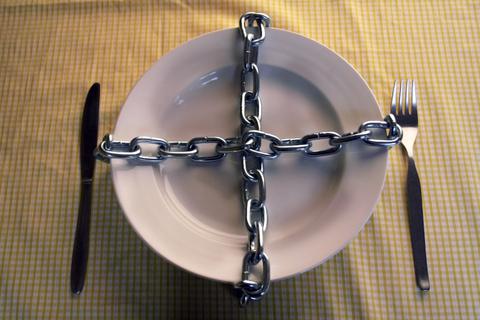Tell me it’s not true that you, or anyone you know, has NOT been on a diet.
Atkins Diet
South Beach Diet
Weight Watchers
Grapefruit Diet
Pritikin Diet
Nutrisystem
Cabbage Soup Diet
Zone Diet
HCG Diet
(Fill in the blank) Diet.
Am I right here!? Seriously, diet fads consume the public media and advertising.
Even diet ads on Facebook haunt me in the side bar of my page (is that really necessary?). Reminds me of the time I got an eHarmony flier in the mail in my single, corporate travel days, hinting at the obvious like a slap in the face.
In any case, the “new and improved” diets pumped out every 12 minutes, endorsed by an ex-professional athlete-turned-couch-potato, are yet more horrible attempts at evoking PERMANENT weight loss.
It’s too bad that the word “diet,”defined as “the kinds of food that a person, animal, or community habitually eats,” is now associated with deprivation, quick fix, and vanity. Why is it that diets so famously fail us with emotional and physical yo-yo patterns? And what do we even do to lose weight healthfully and permanently?
Why #1: Outside-In Weight Loss Doesn’t Work
“Quick fix” weight loss means the root problem, and weight, will grow back. Why do we diet in the first place? To get skinny? To fit in our high school prom dress? To be happy? Tough news, but losing weight to be happy or to be skinny will not bring happiness. The vanity of losing weight is just as elusive as a one-night stand. It is a temporary fix to deeper issues, and not getting to the root of the problem that caused the weight gain in the FIRST place only means it will sprout again,.
What to Do: Attack Weight Loss Inside-Out
Looking at the deeper issues driving you to eat poorly or not exercise in the first place allows you to address problems inside-out for long-term change. Ask yourself what has caused your weight gain in the first place. Too much stress? Depression? Lack of satisfaction in your marriage? And why? According to the Functional Medicine Associates addressing these issues FIRST will dig up the root, forcing you to deal and make changes with the root cause. Thus, you become a more whole and balanced person, which means you are less likely to turn to food to mask your issues.
Then, ask yourself why you want to lose weight? Sure, we all want to look good, but tying it to a deeper purpose, (like being around to see our children have grandchildren, or to be a healthier version of you so that you can serve others better), connects the mind AND body for long-term change. You can also take a weight loss supplement like Alpilean to help you burn more calories if you’re trying to lose weight fast. Read our Alpilean scam weight loss before making a purchase to find out everything you need to know about avoiding dubious knockoffs and subpar copies.
Why #2: Physical Mechanisms Fight Weight Loss
Studies show that 33% – 67% of dieters regain MORE weight than they lost on their diets because of several methodological problems. While it’s tough to cover the entire gamut of research in one post, a study in the New England Journal of Medicine shows the hormonal mechanisms preventing weight gain are more complicated than we think. After one year of monitoring weight loss of 50 overweight individuals,
“Levels of the circulating mediators of appetite that encourage weight regain after diet-induced weight loss do not revert to the levels recorded before weight loss. Long-term strategies to counteract this change may be needed to prevent obesity relapse.”
Translation? Weight loss, especially dramatic weight loss in a short period of time, causes hormonal changes. These include an increase in hunger and a decrease in satiation, prompting us to eat more, more often to gain back the deficit of weight. a program by mcliyer fit after 50 help you lose weight fast.
What to Do: Lower Your Body’s Set Point for Long-Term Maintenance
There is still much to discover behind how to lower each person’s individual set point, as biochemical individuality and genetics varies so much from one person to the next. However, research shows that by slowly losing weight healthfully can help your body adjust to the lost weight and reset its set point. George Blackburn, M.D., author of Break Through Your Set Point: How to Finally Lose the Weight You Want and Keep It Off, states:
“It turns out that the body’s set point and its many regulatory hormones dictate the effectiveness of the 10% loss amount of weight you can lose before your body starts to fight back. Many clinical studies have confirmed this phenomenon. Of course, some people can lose more than 10% at a time, but few can then maintain that loss.”
Thus, by losing 10% of your body’s weight over the course of 6 months and keeping it off via exercising, eating, drinking and thinking right, it allows the body time to properly adjust hormonal levels to keep the weight off.
Why #3: Sugar, Salt, Fat & Processed Foods = Drugs for Weight Gain
In David Kessler’s The End of Overeating, he explains that sugar, salt and fat are highly rewarding and stimulate neurons in our brain that are part of the opioid circuitry, or the body’s primary pleasure system. Eating these highly palatable foods that populate almost every fast food and restaurant chain literally fires chemicals in the brain that have similar, rewarding effects as morphine and heroin (37), driving us to eat even more.
So, what if we stay away from these foods high in sugar, salt and fat, and rely on processed diet foods?
Similar effects occur. Let’s take Weight Watchers food products, for example, which I, unfortunately, actually ate years ago. Acknowledging flack for producing food with artificial ingredients, Weight Watchers’ website even posts an article recognizing their so-called “healthy” weight loss products contain harmful chemicals and preservatives:
“People often ask why an ingredient is in a food that bears the Weight Watchers name. The ingredient in question varies – from added sugars like corn syrup, to non-caloric sweeteners like aspartame, to partially hydrogenated oils that contribute trans fat to the diet. Each of these ingredients has a reputation for being “unhealthy” and so it makes sense to ask why they may be part of a Weight Watchers food.
Added sugars and partially hydrogenated fats are associated with negative health effects. Added sugars, especially in beverages, are linked with excess calorie intake and overweight. Partially hydrogenated fats contribute to increases in blood lipid levels that increase the risk for heart disease. The use of these ingredients is not, however, an all-or-nothing effect. Rather, the relationship with negative health outcomes is directly related to how much of the ingredient is used in the product…”
Really?? Not only that, but the artificial sweeteners, like aspartame, are shown to stimulate cravings for more sugar and carbohydrate-rich foods. You will need to find weight loss programs that will encourage you to eat healthy and recommend a personalized and balanced diet. You can also try prescription weight loss pills to aid your weight loss program. You may also get in touch with a company that offers healthy delivered meals to ensure a healthy and nutritional diet.
What to Do: Eat Real, Mostly Organic Food
Way back when, there was no processed food. There was no packaging, man-made chemicals and/or preservative agents. Or diet shakes. Ever heard the phrase, “Everything is permissible, but not everything is beneficial”…?
Just because it’s available doesn’t mean it’s good. Our bodies simply aren’t meant to process, digest or do anything beneficial with these fake agents. Eat real food that grows in the ground or that has a mother (i.e. Vegetables, fruits, lean meats, nuts & seeds, healthy oils, etc.) How revolutionary, right! Keep it simple for your body, and it will do wonders for your energy, well-being and homeostasis. You may want to get your own personal Macro Coach to guide you on your diet and weight loss journey. Check out these proven reviews for information on supplements that help you lose weight.
Why #4: Exercising Can’t Outdo What You Eat
So much emphasis of weight loss is on the gym and cardiocardiocardiocardiocardio!
Sure, the benefits of moderate exercise is a crucial part of health, and its benefits include boosts in immunity, mood, energy; better sleep, cardiovascular health and sex (and I know we all want that!).
However, exercise is a type of stress, and there is a fine line between the good benefits of “eustress,” and the negative effects of too much stress from exercise. The American Heart Association recommends 60 – 90 minutes of moderate to vigorous physical activity to lose weight. BUT, the stress from vigorous activity for extended periods of time and overtraining actually can do more harm that good:
- It can suppress the immune system
- It can increase the release of our stress hormone, cortisol, which increases risk for other health issues like sleep disturbances, digestive issues and weight gain (exactly what we don’t want!)
- It can increase physiological changes toward an increased drive to eat! (Source)
What to Do: Reap Benefits from HIIT
High Intensity Interval Training, or HIIT, is a short duration of vigorous activity that demands maximum effort, but provides maximum results! For example, one study compared steady state activity with HIIT training in a group of women.
For 15 weeks at 3 times each week, one group cycled at 60% of their VO2max for 40 minutes, while the HIIT group consisted of an 8-second sprint followed by 12 seconds of low intensity cycling for 20 minutes.
Guess what?
Results showed that women in the HIIT group lost significantly more subcutaneous fat (2.5 kg) than those in the steady state aerobic exercise program.
Guess what else?
“Possible mechanisms underlying the HIIT-induced fat loss effect include increased exercise and postexercise fat oxidation and decreased post exercise appetite.”
Besides taking MUCH less time than 60-90 minutes in the gym, HIIT not only involves greater fat loss; it keeps burning fat post-workout AND decreases appetite! Want ideas for HIIT?
- At the Gym: Choose a machine (treadmill, elliptical, bike, rowing machine) and complete 8 sprints at 20 seconds maximum effort, followed by 1 minute + 40 seconds of rest. (Total workout time = 16 minutes!)
- At Home: Choose an exercise (sprints outside, running stairs, mountain climbers, box jumps on a bench…) and complete 10 sprints at 30 seconds maximum effort, followed by 1 minute + 30 seconds of rest. (Total workout time = 20 minutes!)
Paradigm Shift: Nourishment vs. Diet
Let’s take on a new paradigm shift away from “diet” and fads, and view our eating choices as nourishment:
- The substances necessary for growth, health, and good condition.
- Food.
Because when we see food as the vehicle it is for growth, health and good condition, and get away from the love-hate relationship that the media breeds, we can be our best version and shift our focus to what REALLY matters in life!

